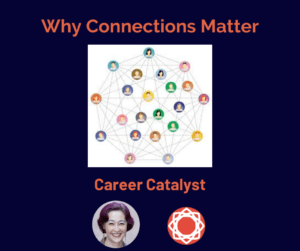
People say it all the time: it’s not what you know, it’s who you know!
And to some extent, that’s true. It’s not the whole story, of course. You do still need to have some skills and knowledge to get into a new role. But even with expertise and mad accomplishments in your background, it’s often a struggle to find a new role. This is where the who piece can come into play.
But don’t think this is necessarily something that happens quickly. Unless you’ve been cultivating your network carefully and intentionally over the years, it’s unlikely that you can simply ask for leads and get them. So think of networking as a bit of a long game. You’re looking to build a group of colleagues for mutually beneficial relationships.
In order to do this, start by finding people who genuinely seem interesting. I know that the common wisdom is to schmooze with hiring managers, but people hit up those folks all the time. They aren’t likely to get invested in your success or feel excited about a role you might love. So instead, focus on people whose job titles sound appealing to you, people who have interesting content on their LinkedIn profiles, people you’ve heard speak and found fascinating. And be sure to look at people you already know, too. If you’re truly interested in people, that interest will come across when you talk to them, and the conversation will flow much more easily.
And when you have those connections, you can reach out to them when you’re looking for a new role. You can ask them for advice about getting into their organization. And, of course, you can be helpful to your contacts, as well, letting them know when positions at your company are about to be posted, connecting them with others, and so forth. (Again, mutual benefit!)
As you can see, when you approach networking this way, it’s a lot less daunting and unpleasant, and it feels much less transactional. You’re not just being a mercenary and pretending interest in someone so that you gain something; you’re building genuine relationships with people you like!



